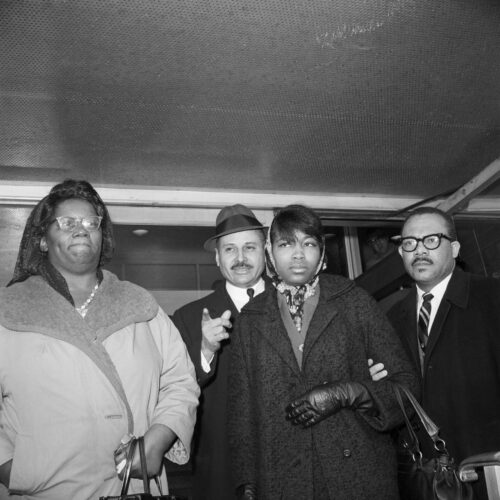Biography
Early Life
Betty Shabazz, the widow of noted intellectual Malcolm X, lived an extraordinary life of faith and advocacy. Born in Detroit, Michigan, in the middle of the Great Depression, Betty Dean Sanders was raised in the Methodist Church by her parents.
She attended college at Tuskegee University in Alabama and Brooklyn State Hospital School in New York where she graduated in 1958 with a nursing degree.
Religion & Family
While in New York, she was invited to attend a meeting/Temple service for the Nation of Islam. She recalled in an interview her conversation with the woman who introduced her to the Islamic faith. “I told her that number one, I was not familiar with the philosophy, and number two, my parents would kill me if they knew I joined another religion and gave up being a Methodist.”
But, the religious doctrine of the Black Muslim congregation appealed to her, as did the charismatic minister Malcolm X. After joining the Nation of Islam, Betty and Malcolm married in 1958. The couple settled in New York and Malcolm catapulted to international fame as one of the most significant voices in the civil rights movement in the 20th century. The couple had six daughters before his infamous assassination in 1965.
Despite being labeled as Malcolm X’s widow, Betty Shabazz led a life filled with activism that extended beyond her marriage. Motherhood remained a central part of her life’s work. She proclaimed in 1969, “The Black Woman has the chief responsibility for passing along black cultural traditions to the children.”
Education & Activism
Shabazz continued her education and earned a master’s degree in Public Health and Administration from Jersey City State College. Then she earned a doctoral degree in education from the University of Massachusetts—Amherst. While in Amherst, she joined Delta Sigma Theta, Sorority in 1974.
She also worked with Black women through organizations like the National Council of Negro Women and lent her support to civil rights causes led by groups like the National Association for the Advancement of Colored Peoples (NAACP).
Shabazz continued to be a powerful voice in the last years of her life. She spoke at the 1995 Million Man March in Washington, D.C., and just months before her death, she spoke in support of sustainable employment for Black communities suffering from economic hardships.
In an LA Sentinel editorial she wrote, “We must reach out–churches, community groups, entrepreneurs, fraternal and sorority groups, and professional organizations–and link more people in our communities to jobs and to skills development training opportunities that lead to employment.”
Betty Shabazz died in 1997 and continues to be one of the most prominent Black women ever affiliated with the Nation of Islam whose faith and activism helped to spur social change.

